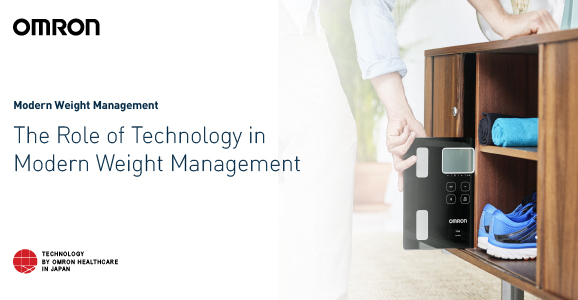The Role of Technology in Modern Weight Management
May 13, 2024 2024-08-06 14:44The Role of Technology in Modern Weight Management

The Role of Technology in Modern Weight Management
In a time when technology permeates almost every part of our lives, weight control has also changed dramatically. The days of merely tracking calories and using a simple scale to measure weight are long gone. Modern technology has completely changed the way we approach health and fitness, providing us with tools that give us a better understanding of our bodies and weight management. Devices like the body fat scale, body composition monitor, body composition scale, and body fat analyzer are important examples of these developments. These devices provide us with extensive insights into our health and improve our capacity to track our development.
Understanding Body Composition
Conventional scales solely consider our weight when measuring our health. But weight by itself doesn’t give the whole story. For instance, the body compositions of two people who weigh the same may differ significantly. One individual may have a higher percentage of muscle mass whereas the other individual may have more body fat. In this case, body composition scales are helpful.
Beyond calculating weight, a body composition scale examines the amount of water, fat, muscle, and bone in the body. People may more successfully adjust their food and exercise regimens by knowing these parameters, which will help them reduce fat while maintaining muscle mass. This all-encompassing strategy is essential for reaching long-term fitness and health objectives.
Advanced Monitoring with Body Composition Monitors
This is furthered by body composition monitors, which offer continuous and thorough surveillance of these measures. Apps that sync data in real-time and provide trends and insights over time are frequently included with these devices. This never-ending feedback loop is crucial for keeping motivation high and helping you make wise decisions. For example, if a body composition monitor records a rise in muscle mass but a fall in weight, this may suggest that a workout program is successfully burning fat and gaining muscle.
The Precision of Body Fat Scales
Body fat percentage and total weight are particularly measured on body fat scales. They send a tiny, safe electrical current across the body to measure body fat using a technique called bioelectrical impedance analysis (BIA). The scale is able to determine the relative amounts of fat and muscle because they conduct electricity in different ways. With the assistance of this accuracy, users may determine if they are losing muscle or fat and modify their workout and nutrition appropriately.
A body fat scale can give important information to those who are trying to lose weight. It assists in distinguishing between true loss of fat and loss of muscle, which is frequently a worry while following calorie-restricted diets. Achieving a toned body and a healthy metabolism requires maintaining muscle mass while losing fat.
In-Depth Analysis with Body Fat Analyzers
The most thorough understanding of body composition may be obtained with a body fat analyzer. Visceral fat, or the fat accumulated around internal organs, is a crucial sign of health concerns and is frequently included in the thorough breakdown that these devices frequently offer. Conditions including heart disease, diabetes, and several types of cancer have been associated with elevated amounts of visceral fat. Via dietary and lifestyle modifications, people can proactively reduce health risks by tracking their visceral fat on a regular basis.
Integration with Health Ecosystems
These days, body fat scales, body composition monitors, body fat analyzers, and body composition scales frequently work in unison with larger health ecosystems. An individual’s health data may be viewed centrally thanks to the syncing of several devices with smartphones, fitness trackers, and health applications. Users may now connect changes in body composition with other data like heart rate, physical activity, and food consumption thanks to this integration.
For example, combining a fitness tracker with a body composition monitor may show the effects of various workouts on fat loss and muscle building. In a similar way, pairing these gadgets with nutrition applications enables users to pinpoint the specific meals that improve body composition. This all-encompassing viewpoint encourages a more knowledgeable and complete approach to exercise and wellness.
Empowering Individuals with Data
The main benefit of employing these cutting-edge technical instruments is that data empowers people. People can make educated decisions about their health when they have access to comprehensive, real-time body composition data. After all, knowledge truly is power. It also adds a level of drive and accountability. It may be quite inspiring to see noticeable improvements in body composition measures, fat reduction, or muscle building. This helps keep people motivated to continue working toward their fitness and health objectives.
Conclusion
Technology has a revolutionary role in today’s weight control. Beyond what ordinary scales can provide, devices such as body composition scales, body composition monitors, body fat scales, and body fat analyzers offer extensive information. People may improve their health outcomes, make smarter decisions, and successfully customize their exercise and nutrition routines by grasping the subtleties of body composition. Future developments in technology will undoubtedly result in even more sophisticated devices, fundamentally altering the way we think about wellness in general and weight control in particular.






